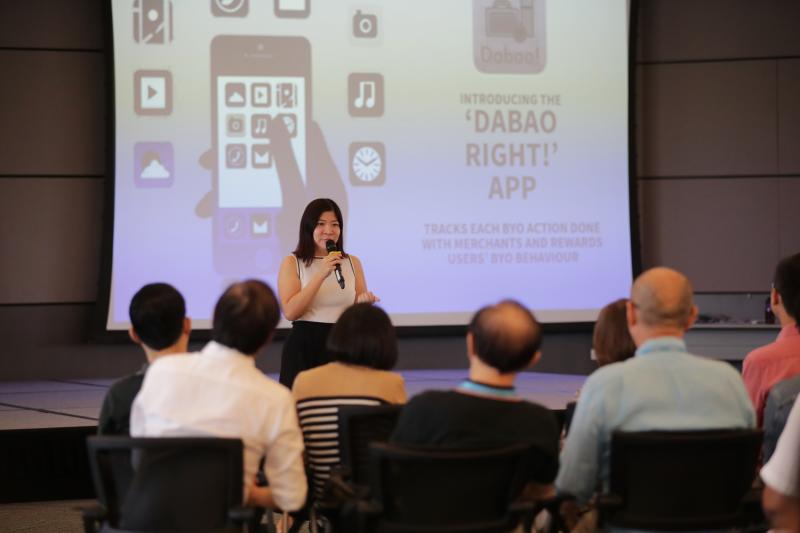Transparent bin and other fresh ideas from public workgroup to help Singapore recycle right
Sign up now: Get ST's newsletters delivered to your inbox

Marketing manager Lee Peilin presenting her team's Dabao Right mobile app during a workgroup on "recycling right", organised by the Ministry of Environment and Water Resources, on Oct 20, 2019.
ST PHOTO: GIN TAY
SINGAPORE - A mobile application that provides incentives and discounts to motivate customers to bring their own containers to "dabao" (or take-away) their food, instead of using single-use plastic containers.
And special transparent recycling bins so that people will be able to see just what they are throwing into them, with eye-level signs to remind them to clean and dry their items before putting them in the bin.
These initiatives are two of the nine ideas that 45 members of the public came up with within a month, as part of a workgroup on " recycling right" organised by the Ministry of Environment and Water Resources (MEWR).
The fourth and final session of the workgroup was held on Sunday (Oct 20) at the MEWR building in Scotts Road.
The nine teams in the workgroup submitted their reports in the afternoon for consideration by MEWR and the National Environment Agency.
The workgroup is part of a push by the Government to work hand-in-hand with the people to design and implement solutions across a range of issues and policy areas.
It is similar to a Citizens' Panel on work-life balance that will be held until Nov 9 this year to look at the challenges of managing work and family commitments.
Marketing manager Lee Peilin, 36, told The Straits Times that her team had proposed the development of a mobile application that gives incentives such as discounts to people who use their own containers for take-away food items.
The app would involve merchants keying in a pin code to register users who bring their own containers instead of using single-use containers.
Ms Lee's team surveyed 22 merchants to find out if the idea would work and 84 per cent of them said they would be willing to participate in such an application as part of their business.
"We were very heartened and encouraged that merchants were so open to the idea. We hope that a wider survey can be done to assess the app's feasibility," she said.
Meanwhile, Mr Lim Chwen Liang, 55, who is semi-retired, said his team proposed the idea of transparent bins to replace Singapore's current blue recycling ones.
"We found that blue recycling bins were full of contamination, which makes whatever is in the bin unable to be recycled. We wanted to educate the public as to what should be placed in the bins," he said.
His team developed a prototype of a new transparent recycling bin within four weeks.
These include eye-level signs to let people know what they should or should not throw into the recycling bins, to prevent food waste and other contaminants from being put into them.
These transparent bins will also have slots for cans and paper so that large household items cannot be placed into them.
Other proposals included a suggestion to use community "influencers" both online and offline to motivate people to recycle only clean and dried items, and a deposit-and-recycle system for beverage containers.
Dr Amy Khor, Senior Minister of State for the Environment and Water Resources, commended the workgroup on its efforts to address the challenge of convincing more Singaporeans to recycle right.
"Our domestic recycling rate has stagnated at 20 per cent for a while," she said.
"This is a real challenge, and we are hoping some of the ideas you have raised can improve the recycling rate."


